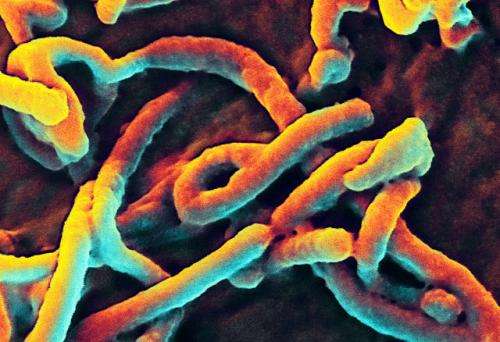Researchers find how Ebola disables the immune system

A new study at The University of Texas Medical Branch in Galveston sheds light on how Ebola so effectively disables the human immune system.
Virologist Alex Bukreyev, UTMB professor and senior author of the study, said the research team engineered versions of the Ebola virus in order to study how the components responsible for thwarting or disabling our immune defenses wreak their havoc. The findings are described in the new edition of PLOS Pathogens.
For the past 16 years, there has been an extensive investigation of how the Ebola virus operates when it invades a new host such as a human and how it interferes with interferons—specialized signaling proteins that are made and released in response to an invasion by a virus or other pathogen. Interferons directly inhibit replication of viral particles in cells. A focus of this research has been how Ebola gets around the host's cell-mediated immune response, which is another defense mechanism involving some specialized immune cells that either kill virus-infected cells or secrete antibodies that directly neutralize the virus.
Previous studies have identified two protein regions within the Ebola virus' structure called interferon inhibiting domains, or IIDs, that prevent the host's interferons from doing their job thus disabling the host's immune system defenses. As a result, these IIDs promote replication of the virus within the host. However, researchers have assumed that IIDs only inhibit the effects of interferons—until now.
The study used genetically altered strains of the Ebola virus that were designed with one or both of the IID's disabled to study what they do to the host. The altered viruses were placed on specific types of immune cells isolated from human blood, called dendritic cells, T lymphocytes, B lymphocytes and natural killer cells, as these types of cells are key players in marshaling defenses.
"We found that IIDs work not only in ways previously established, which includes interference in cascades of protective biochemical reactions that occur in cells in response to Ebola that limit infection", Bukreyev said. "The IID's also counter the activity of immune cells, including T lymphocytes and natural killer cells that kill virus-infected cells as well as B lymphocytes that secrete antibodies." "It's a double edged sword—the IIDs not only block interferon signaling, they also prevent infected cells from activating the cell-mediated arm of the immune response," said Patrick Younan, research scientist and co-lead author of the paper. "You take away these functions of Ebola virus and the immune system should clear the infection."
Bukreyev said, "taken together, the findings suggest that Ebola IIDs have a global dampening effect on the host's ability to fight off the impending Ebola infection, and also indicate the potential benefits of blocking the immunosuppressive effects of IIDs as a potential therapy for Ebola infection."

















